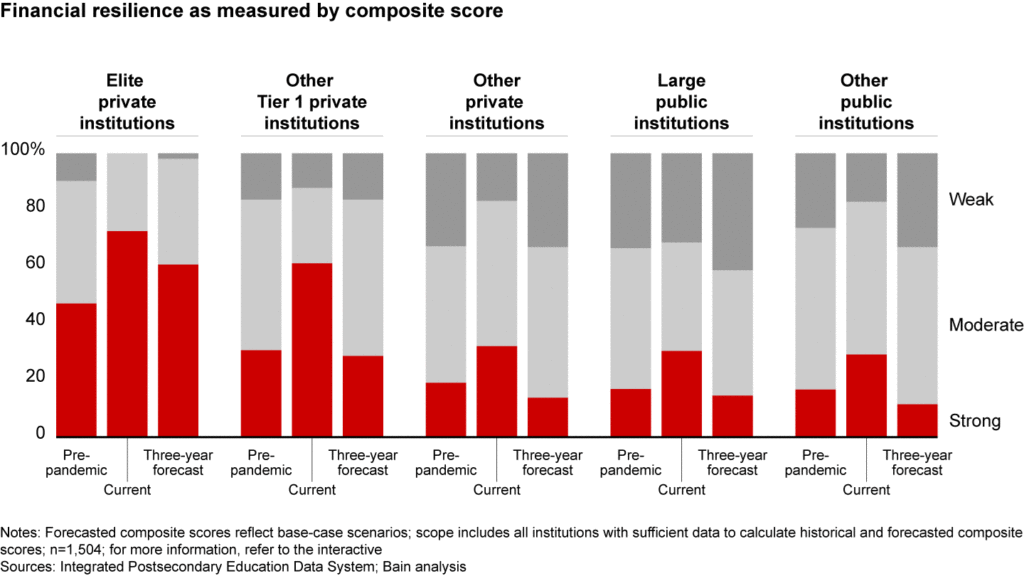As we step into 2024, the landscape of higher education continues to undergo significant transformations, following a challenging year in 2023. According to a recent Forbes article, this sector is poised for more disruptions with four key trends set to reshape higher education.

✅ AI Essay Writer ✅ AI Detector ✅ Plagchecker ✅ Paraphraser
✅ Summarizer ✅ Citation Generator
Key Takeaways
- A significant number of colleges, especially those struggling financially, are expected to either shut down or merge due to a lack of emergency federal funds and the need to revamp their business models.
- Online education continues to gain popularity, but the sector will most likely face a shakeout as competition intensifies, focusing on affordability and value.
- Apprenticeships are set to become a more common pathway outside traditional trades, offering lower-risk, meaningful alternatives to conventional higher education.
The Closure and Merger Wave
2024 is expected to witness an uptick in the number of colleges closing or merging compared to 2023. The withdrawal of federal emergency funds leaves many institutions vulnerable, particularly those already on shaky financial ground. A report from Bain & Company suggests that to survive and thrive, two-thirds of educational institutions must overhaul their business models. This trend is driven by declining enrollments, the rise of disruptive alternatives, demographic shifts, and escalating spending in higher education.

Online Learning Evolution
Online learning, which saw 70% of students enrolling in at least one course in 2021-22, continues to thrive. However, the sector is entering a phase of competition based on price and value. As the Forbes article notes,
“No longer will it be enough to simply have an online program.”
Traditional institutions will need to reconsider their pricing strategies for online programs, focusing more on providing value rather than relying on them to support campus operations.
Growth of Major Universities
Institutions like Western Governors University, Southern New Hampshire University, and Arizona State University are expected to expand further. Their growth can be attributed to the advantages of scale in online learning, allowing for greater investment in learning design and student support. These universities also benefit from robust marketing strategies, including advertising, student referrals, and partnership opportunities due to name recognition.
The Rise of Apprenticeships
Apprenticeships are gaining ground as a popular alternative to traditional higher education, extending beyond the trades. They offer less risky pathways to good jobs, enjoying bipartisan support and increasing interest from individuals seeking meaningful career opportunities. Ryan Craig’s book “Apprentice Nation” highlights the attractiveness of apprenticeships in the current educational landscape.
How Does All This Influence Students?
As we can see from these predictions, there’s a high possibility that students will encounter a dramatically transformed higher education landscape. The sole increase in college closures and mergers, for example, could significantly narrow students’ choices, potentially leading to larger class sizes and reduced personal attention at surviving institutions. However, this could also drive a surge in the quality and competitiveness of the remaining colleges.
The evolution of online learning, on the other hand, with its focus on value and affordability, promises greater accessibility and flexibility for students, particularly for those balancing education with other commitments. This shift might also encourage a more diverse student population, as online programs become more financially feasible.
The expansion of major universities is also not necessarily a bad sign. It could provide students with enhanced learning experiences and better support systems, although it could also widen the gap between prestigious and smaller institutions. Lastly, the growing popularity of apprenticeships presents students with practical, low-risk alternatives to traditional higher education, offering real-world experience and potentially smoother transitions into the workforce.
These trends, collectively, could herald a more pragmatic, skills-focused educational environment, aligning more closely with evolving job market demands and student expectations in 2024.
Follow us on Reddit for more insights and updates.





Comments (0)
Welcome to A*Help comments!
We’re all about debate and discussion at A*Help.
We value the diverse opinions of users, so you may find points of view that you don’t agree with. And that’s cool. However, there are certain things we’re not OK with: attempts to manipulate our data in any way, for example, or the posting of discriminative, offensive, hateful, or disparaging material.